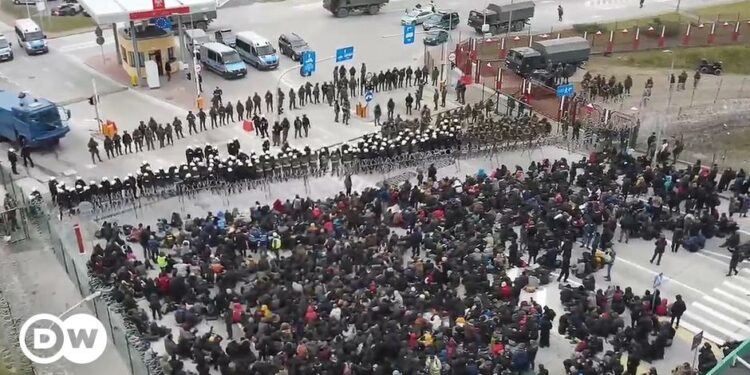On June 13, Poland redeployed a roughly 60-kilometer (40-mile) no-entry buffer zone along its border with Belarus, a 200-meter wide area off limits to all non-residents, including humanitarian groups and journalists. Poland’s previous government temporarily set up a larger buffer zone along its entire border in 2021.
The main purpose of the zone is to ensure the safety of locals and security officials on duty at the border and to limit the activity of human smugglers, said border guard spokesperson Juzwiak.
Since the start of the migrant crisis, he added, migrants have become more and more aggressive. “They are using dangerous tools, knives, knives attached to sticks, clubs, slingshots. Stones, branches, burning branches are thrown at the Polish patrols,” said Juzwiak.
On May 28, a young Polish soldier was stabbed in the chest by a migrant through the bars of the border fence near the village of Dubicze Cerkiewne. He later died as a result of his injuries.
Rights, freedoms of all migrants must be respected: IOM
Refugee rights groups have spoken out against the buffer zone, saying it will prevent them from assisting migrants who cross the border in remote areas and are in need of food or medical assistance.
Poland, Latvia and Lithuania have repeatedly been criticized by humanitarian organizations for their approach to handling the crisis. NGOs have accused the countries of violating human rights by using a “pushback” tactic to expel migrants and asylum-seekers. Individuals and groups who have tried to assist migrants are often detained and prosecuted.
The Polish Border Guard reported that on the section of the Polish-Belarusian state border, 196 helpers and organizers of illegal border crossings were detained this year as of June 10.
The International Organization for Migration has called on all three states to ensure that rule of law is upheld at the borders, and that the human rights and freedoms of all migrants are respected, regardless of immigration status.
“The fundamental responsibility to protect vulnerable people should be shared among states in a spirit of solidarity and in adherence to international obligations and commitments,” a spokesperson told DW, adding that the IOM has also called for an end to the use of migrants for political purposes.
Prime Minister Tusk (left) visited troops stationed at the border with Belarus in MayImage: Artur Reszko/pap/dpa/picture alliance
But speaking on a visit to the border in May, Polish Prime Minister Donald Tusk was undeterred in the fight against illegal migration organized by Russia and Belarus.
“There is no room for negotiation. Poland’s border must be protected,” he said. “Polish troops, border guards, officers have become the targets of aggression, and you have every right, not to say an obligation, to use every means available to you […] when you are defending not only the border but also you own life.”
Edited by: Martin Kuebler
In eastern Poland, locals fear border zone will kill tourism
To view this video please enable JavaScript, and consider upgrading to a web browser that supports HTML5 video
Source link : https://www.dw.com/en/poland-baltics-step-up-border-controls-amid-migrant-crisis/a-69350351
Author :
Publish date : 2024-06-16 07:00:00
Copyright for syndicated content belongs to the linked Source.



